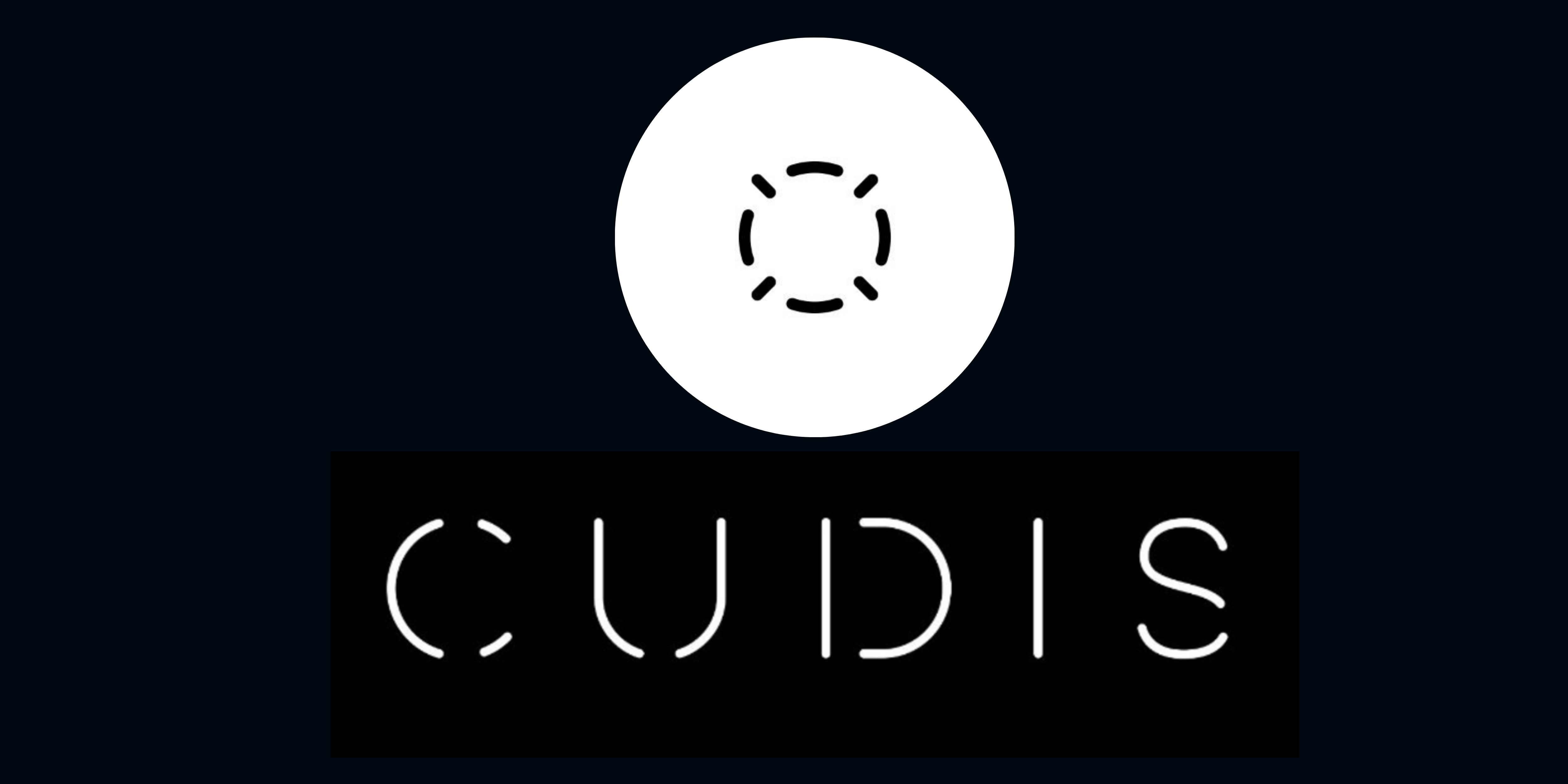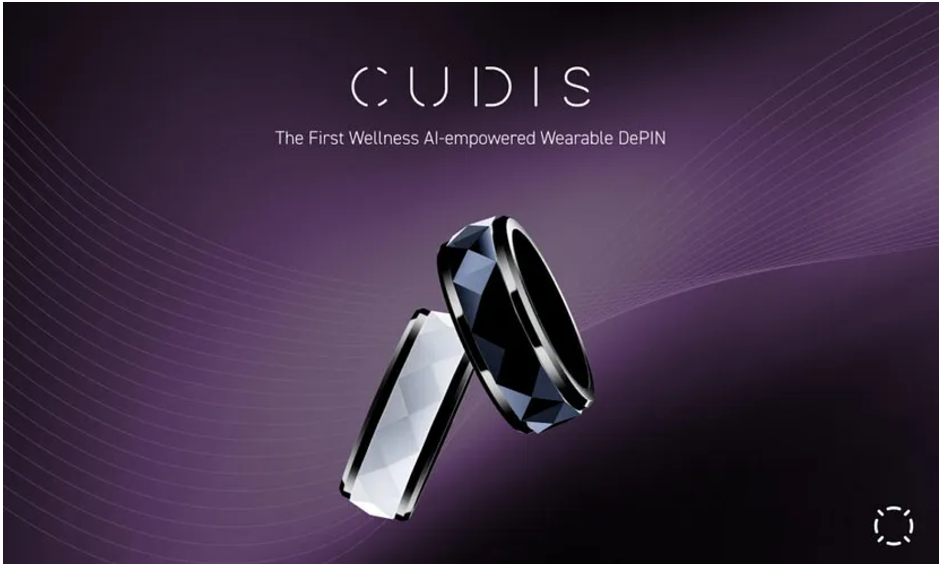
CUDIS is the first AI-powered wearable DePIN product designed to promote data ownership while rewarding users for their wellness journey. It is an AI-powered smart ring designed to track wellness journeys and an AI-powered wellness dapp that recognizes and rewards you for the journey. With the first-generation CUDIS Ring already on the market, CUDIS is creating a wellness consensus, fueled by point incentives. This innovative approach places the power of health and well-being directly at your fingertips, combining cutting-edge AI with the autonomy of data ownership. Beyond hardware, CUDIS offers a holistic ecosystem. Integrating smart devices, intuitive software, an engaging economy, vibrant social interactions, and a commitment to a healthier lifestyle, CUDIS transcends conventional fitness trackers, delivering an unparalleled wellness experience.
About the Project
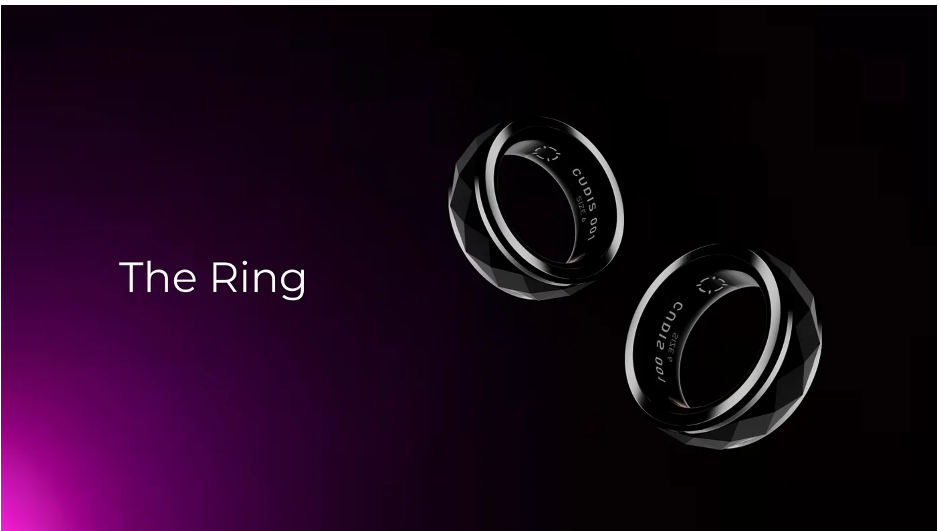
Vision
CUDIS wants to make wellness tracking accessible to all. Its vision centers around personalized health management and data ownership. The company aims to empower users by integrating wearable technology, blockchain, and AI to create a smart ring that monitors health metrics and rewards users for their wellness efforts.
Problem
Wearable health technologies have gained significant popularity in recent years, but their development and implementation come with several complex challenges:
- Data Privacy and Security Concerns: These devices collect extensive health data, raising concerns about user privacy. Companies must implement strong security measures to protect sensitive information and ensure that access is limited to authorized individuals.
- Interoperability and Integration: The healthcare sector employs various devices and systems, making seamless integration difficult. Effective interoperability is essential for healthcare professionals to access comprehensive health data for informed decision-making.
- High Costs: While the prices of wearable devices are decreasing, integrating them into existing healthcare infrastructures can be costly. Legacy systems may require significant investment to achieve compatibility with new technologies.
Solution
Data Ownership and Monetization: Unlike conventional wearables that place control of user data in the hands of companies, CUDIS empowers users to retain ownership of their health data. Users can earn rewards by contributing anonymized information for research purposes, transforming the traditional data monetization model.
Cost-Free Service: While many smart wearables require annual subscription fees ranging from $72 to $360, CUDIS provides services at no additional cost, ensuring accessibility for all users.
Interoperability and Integration: CUDIS offers seamless access to global wellness data, enabling personalized solutions and services. Integrating with various digital health platforms delivers tailored recommendations and interventions, fostering a connected and efficient wellness ecosystem.
Market Analysis
The global market for wearable technology in healthcare was valued at approximately $42.6 billion in 2023 and is projected to grow to $169 billion by 2029, reflecting a compound annual growth rate (CAGR) of 25.82% during the forecast period from 2024 to 2029.
This growth is driven by increasing health awareness among consumers, the rising prevalence of chronic diseases, and advancements in sensor technology that enhance the capabilities of wearable devices. As these technologies evolve, they become essential tools for monitoring health metrics and facilitating proactive health management.
Competitors –
- Oura Ring: Known for its advanced sleep-tracking capabilities, Oura Ring is one of the most prominent competitors. Valued at $2.5 billion in 2022, it offers a subscription model for accessing in-depth health insights, which can cost users an additional $72 annually on top of the ring’s purchase price.
- Pulse: Pulse is a comprehensive health and wellness platform that combines a wearable device with a mobile application to track fitness, sleep, and nutrition. It offers personalized insights and rewards for healthy habits, enhancing user engagement. Key features include convenient wireless charging, built-in digital wallets for seamless transactions, AI-powered insights for tailored health recommendations, and incentives for sharing health data. Overall, Pulse aims to provide a holistic approach to health management through advanced technology and user-friendly functionality.
Uniqueness – Unlike competitors, which impose additional fees for comprehensive insights and coaching, CUDIS introduces an incentive mechanism that allows users to monetize their health data. This innovative approach grants users unparalleled ownership of their information and ensures that their wellness metrics are securely encrypted and stored on the blockchain, providing complete data safety.
CUDIS empowers users to continuously monitor vital metrics, including heart rates and sleep patterns, complemented by a unique AI-powered fitness coach. This feature offers 24/7 insights into personal wellness, all while maintaining user control over their data. By prioritizing user rights and integrating advanced technology, CUDIS is redefining the landscape of wearable health devices.
Features
- Personalized Health Monitoring: CUDIS combines advanced AI with wearable sensors to track key health metrics such as heart rate, sleep patterns, and physical activity. This data is analyzed to provide tailored health recommendations, helping users optimize their well-being.
- Real-Time Health Insights: Leveraging AI-powered capabilities, CUDIS delivers instant feedback on health metrics, enabling users to make timely interventions. This feature is particularly beneficial for managing chronic conditions and preventing potential health concerns.
- Data Ownership and Privacy: CUDIS prioritizes user data ownership by ensuring full control and privacy. Health data is encrypted and securely stored on the Solana blockchain, guaranteeing access solely by the user and safeguarding it from unauthorized access.
- Cost-Free Service and Data Monetization: Unlike traditional wearables that charge subscription fees and do not offer data ownership, CUDIS provides free services. Additionally, users can retain ownership of their data and explore potential monetization, making wellness management more affordable globally.
- Integration with IPFS: To enhance security and anonymity, CUDIS utilizes the InterPlanetary File System (IPFS) for data storage. Indexing data on the Solana blockchain and storing it via IPFS ensures robust protection against breaches and unauthorized access.
- Advancing Preventive Healthcare: Preventive healthcare is a core focus of CUDIS. Through continuous monitoring and early detection of potential health issues, users are empowered to take proactive measures. This approach helps mitigate the risk of severe health conditions and improves overall quality of life.
Traction
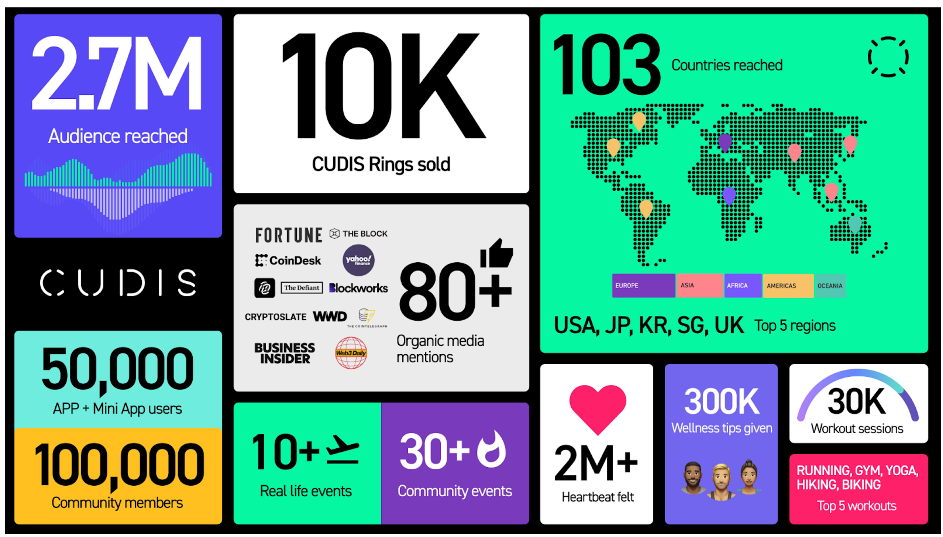
CUDIS has demonstrated significant traction since its launch, having sold 10,000 Genesis Rings since May. The company boasts a cohesive community of 100,000 members across 103 countries, with 50,000 active users engaging with the CUDIS app. Additionally, over 300,000 personalized workout tips have been delivered to users, highlighting the platform’s effectiveness in promoting health and wellness. CUDIS has also gained recognition in leading publications such as Coindesk, Fortune, and Vogue, further establishing its presence in the wearable technology market.
Investors
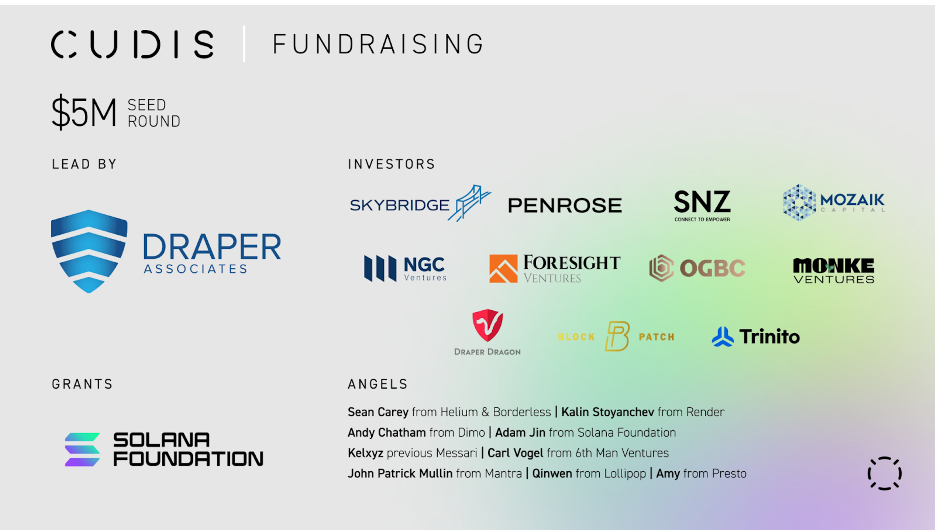
Team
CUDIS Ring was co-founded by Edison Chen, who serves as the CEO. Chen graduated from UCLA with a degree in Geography, focusing on Management and Entrepreneurship. Prior to founding CUDIS, he gained significant experience as a serial entrepreneur and investor, managing a $200 million fund at a top-tier venture capital firm and investing in various sectors since 2016. His vision for CUDIS centers on integrating wellness with technology, emphasizing user data ownership and personalized health insights through AI.
Conclusion
CUDIS is transforming the wellness industry by effectively addressing key challenges such as data ownership, privacy concerns, and motivation sustainability. It offers a compelling alternative to traditional wearables by bridging the gap between Web2 and Web3, paving the way for a secure, decentralized future. By expanding its ecosystem to include health providers, insurance companies, and fitness centers, CUDIS aims to facilitate seamless integration of wellness services.
With its innovative features and user-friendly interface, CUDIS has the potential to onboard millions of users into the Web3 space. Looking ahead, CUDIS is committed to continuous innovation and redefining health and wellness approaches. More than just a product, it represents a movement towards a healthier and more empowered lifestyle, where technology genuinely serves the needs of humanity.
| Fundamental Score | |||||
| Max score | Options | Score | |||
| Problem | 10 | Significant, long-term problem | 9 | ||
| Solution | 10 | Distinct, defensible solution | 9 | ||
| Market Size | 10 | Large market, significant growth potential | 8.5 | ||
| Competitors | 10 | High competition, but room for differentiation | 7 | ||
| Use case | 10 | Use case with good potential | 8.5 | ||
| Current Traction | 10 | Early traction, user engagement starting to grow | 6 | ||
| Unit Economics | 5 | Break-even or slightly positive unit economics | 2 | ||
| Tokenomics | 10 | Basic token strategy, potential for improvement | 7 | ||
| Product Roadmap | 5 | Basic roadmap, lacks detail or innovative features | 2 | ||
| Business Model | 10 | Business model with some potential, but improvement needed | 7 | ||
| Go-to-Market Strategy | 5 | Solid GTM strategy, clear target market and channels | 4 | ||
| Community | 5 | Acive and growing community | 4 | ||
| Regulatory Risks | 5 | Minimal regulatory risk, strong mitigation and adaptability | 5 | ||
| Total Score | 75.24% | ||||

